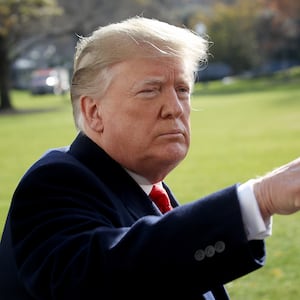It’s like the Hunger Games finally came to Washington. Whether it’s a desire to shift attention away from legal filings and criminal charges or just the normal cycle of midterm transitions, the feverish pace of personnel announcements and character assassinations guarantee that we’re worse off security wise today and down the road.
I worked under four chiefs of staff, two Secretaries of State, two Secretaries of the Treasury, and three Secretaries of Defense during President Obama’s first term. Change is not necessarily a bad thing, but it’s chaotic under the best of circumstances. And with the shadow of the Mueller probe hanging over each and every personnel decision, President Trump’s approach to these changes is a lesson in how not to pick, choose, and fire members of a team if you want it to be cohesive going forward.
Handling even one transition at a time takes a lot of work. While coming up with a list of potential replacements, vetting them, figuring out how they would play with various constituencies, and then managing the actual announcement itself, the primary focus is often on avoiding any blackout period during which important work and institutional knowledge could fall through the cracks. Any public image of disorganization or lack of continuity signals that we’re disorganized and vulnerable—it’s a prime time for opportunists of all shades and colors (including our enemies) to try to take advantage of dropped balls to make headway against us.
Transitions can be vulnerability goldmines if not handled with care. If there isn’t the necessary process in place, the institutional knowledge on a key terrorist threat or the state of play on covert outreach to a rogue regime official could be gone with the wind, handicapping policy and making each of us less safe. When I helped manage a National Security Advisor’s transition, we took weeks to document and archive our work so that his successor knew everything she needed to know to perform her responsibilities which included keeping Americans safe.
That’s why making so many personnel announcements at one time begs the question of whether there’s the capacity to give each one the time and attention it needs to ensure that there isn’t any empty space ripe for exploitation. It’s entirely unclear whether this need for speed will allow White House personnel to give the president a list of qualified nominees (query whether the president would read it) that can actually get confirmed and then of course handle the actual work ahead of them. Doing it fast doesn’t mean doing it right.
That’s exactly why Putin’s probably enjoying this White House shuffle. Nominating a State Department spokesperson and former media figure to one of the most complex diplomatic posts in the country or putting a young aide into the Chief of Staff post don’t really signal a desire to put experienced professionals into powerful positions. That’s Putin’s gain because it undermines confidence in our institutions—like our mission to the UN and the White House itself—and will make us weaker internally and externally at exactly the same time.
Incoming and outgoing officials have more than Trump in common. Each American that works for this president does so knowing that there is a big chance they’ll end up implicated, perhaps inadvertently, in ongoing investigations. Every decision that the president has made, and will make, on Russia policy could be tainted by his other interests which should lead the special counsel (and perhaps the new Congress) to question officials about whether these conflicts of interests impacted policy decisions. Officials who served with Trump on the campaign, or are administration officials referenced in the Mueller filing on Manafort or as part of the work on Russia-related matters Mueller mentioned in his separate Cohen filing, likely have information pertinent to criminal proceedings.
Coupled with the legal concerns associated with being invited to the president’s holiday staff party, the president’s penchant for lambasting his former staff doesn’t bode well for attracting the best talent during these transition searches. Few former Trump officials have escaped his Twitter ire, and while, in my experience, people proactively contacted White House personnel during previous transition searches because they wanted to make the magic list, it’s hard to imagine an overabundance of Americans eager to take on both legal woes and reputational ones.
Add to that the fact that the president doesn’t seem to rely heavily on his team’s actual opinions—instead preferring to go with his gut over his staff’s analysis—and the upside to throwing your hat in the ring gets smaller every day.
The best thing the president could do right now is to slow down the transition train and let his personnel staff do their jobs while he cools his heels on the Tillerson Twitter diatribes. Otherwise, he’s opening us up to self-inflicted wounds—our enemies will exploit any vulnerabilities caused by hasty transitions while the president himself potentially further turns off qualified Americans from serving in his administration because the costs of doing so increasingly outweigh the benefits.






